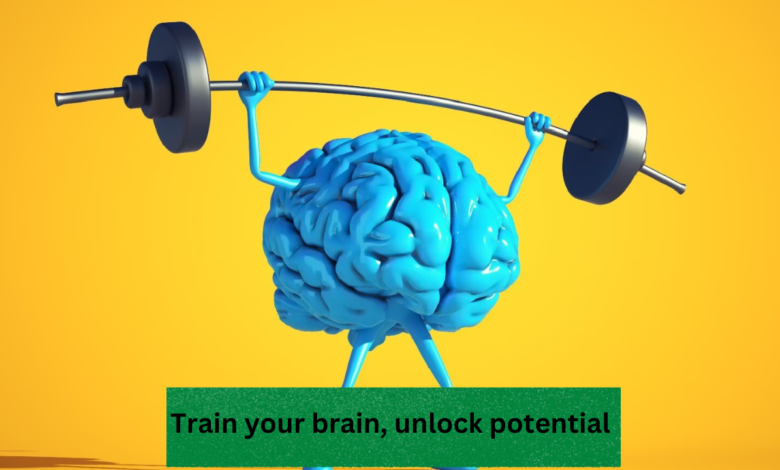Brain Exercise: Proven to Enhance Memory, Focus, and Cognitive Health

Brain Exercise-In today’s fast-paced world, mental health and cognitive sharpness are becoming just as important as physical fitness. As we age, our brains naturally begin to slow down, and the memory lapses that once seemed rare can become more frequent. However, just like a muscle, the brain can be strengthened and honed through targeted activities. Brain exercises, or cognitive exercises, are designed to challenge the brain, promote neuroplasticity, and ultimately improve memory, concentration, problem-solving, and other cognitive functions. But what exactly is brain exercise, and how does it impact our mental health?
This article dives deep into brain exercise, its benefits, and practical ways to incorporate it into daily life. We’ll explore how the brain works, why it needs exercise, the types of brain exercises available, and scientific evidence supporting the positive effects of cognitive training.
Table of Contents
ToggleUnderstanding the Brain: A Quick Overview
The brain is the command center of the human body, responsible for controlling everything from emotions and thoughts to physical movement and bodily functions. It’s made up of billions of neurons (nerve cells) that communicate with each other through synapses. These neural networks form the basis of all our mental and physical actions.
Neuroplasticity, or the brain’s ability to reorganize itself by forming new neural connections, is what allows learning and memory to take place. In simpler terms, neuroplasticity enables the brain to adapt and change, even into adulthood. While it was once believed that the brain’s ability to change diminished significantly after childhood, modern research has shown that the brain retains a significant level of plasticity throughout life. This means that, even as we age, it’s possible to continue strengthening and optimizing brain function.
Why Brain Exercise Matters
Just as physical exercise is essential for maintaining bodily health, brain exercise is crucial for maintaining cognitive health. The brain, like any other organ, ages over time. Age-related cognitive decline can lead to issues such as memory loss, decreased processing speed, and impaired problem-solving abilities. However, by regularly challenging the brain, we can potentially slow down this decline and even improve cognitive function.
Benefits of Brain Exercise
1. Improved Memory
Brain exercises that involve recalling information, such as playing memory games or learning new skills, can help enhance memory retention and recall. Over time, these activities can improve both short-term and long-term memory.
2. Enhanced Focus and Attention
Many brain exercises focus on improving attention span and concentration. Whether it’s through meditation, puzzles, or mindful activities, regularly engaging in tasks that require focus helps train the brain to block out distractions and stay on task.
3. Increased Problem-Solving Ability
Brain exercises often involve complex thinking and problem-solving. Activities like puzzles, strategy games, or learning new concepts can boost cognitive flexibility and enhance problem-solving skills.
4. Boosted Creativity
Certain brain exercises encourage thinking outside the box and coming up with creative solutions to challenges. Engaging in activities that challenge your imagination, such as storytelling, drawing, or even playing musical instruments, can stimulate creative thinking.
5. Delayed Cognitive Decline
Studies suggest that regularly engaging in mentally stimulating activities can help delay the onset of age-related cognitive decline. People who engage in brain exercises may reduce their risk of developing conditions like dementia and Alzheimer’s disease.
6. Reduced Stress and Anxiety
Brain exercises that involve mindfulness, meditation, or relaxation techniques can help reduce stress and anxiety by promoting mental clarity and emotional balance. A calm mind is more effective at processing information and making decisions.
Types of Brain Exercises
There is no one-size-fits-all approach to brain exercise, as different activities stimulate different areas of the brain. The key is to engage in a variety of activities that challenge different cognitive functions. Below are some effective types of brain exercises:
1. Puzzles and Games
Puzzles and games that require logical thinking, strategy, and problem-solving are excellent brain exercises. Some of the most popular include:
- Sudoku: A number-based puzzle that requires logical thinking and concentration.
- Crossword Puzzles: These challenge verbal skills and memory.
- Chess: This classic game of strategy and foresight requires players to think several steps ahead.
- Rubik’s Cube: A 3D puzzle that challenges spatial awareness and problem-solving.
Games like these can help improve memory, enhance problem-solving abilities, and sharpen focus.
2. Learning a New Skill
Whether it’s learning a new language, playing a musical instrument, or taking up knitting, acquiring a new skill requires the brain to form new neural connections. Studies have shown that learning a new language in particular helps to improve memory, attention, and cognitive flexibility.
3. Reading and Writing
Reading regularly helps improve vocabulary, comprehension, and critical thinking skills. Whether it’s fiction, non-fiction, or academic literature, reading challenges the brain to process new information and make connections between different concepts.
Writing, especially creative writing, is also a powerful brain exercise. It engages memory, language skills, and creativity. Journaling, storytelling, or writing essays helps train the brain to organize thoughts and express ideas clearly.
4. Physical Exercise
While brain exercises are typically mental activities, physical exercise has a profound impact on brain health. Exercise increases blood flow to the brain, promotes the growth of new neurons, and enhances neuroplasticity. Aerobic exercises like running, swimming, or cycling have been shown to improve cognitive function and boost memory.
5. Mindfulness and Meditation
Mindfulness practices and meditation are excellent for training attention and emotional regulation. These practices help improve focus, reduce stress, and promote mental clarity. By learning to quiet the mind, meditation allows individuals to better manage distractions and improve their overall mental well-being.
6. Social Engagement
Interacting with others in meaningful ways stimulates cognitive processes. Engaging in conversations, debates, and social activities like card games or group discussions can help maintain cognitive sharpness. Social interaction is a natural way to exercise various cognitive functions such as memory, emotional regulation, and communication skills.
7. Memory Training Exercises
These exercises are designed specifically to improve memory recall. Activities such as remembering lists, playing memory card games, or using mnemonic devices help train the brain to retain and retrieve information more efficiently. These exercises are particularly helpful for people looking to strengthen their short-term memory.
Brain Exercises for Specific Age Groups
Brain Exercises for Children
For children, brain exercises should focus on fostering creativity, critical thinking, and problem-solving. Activities like building blocks, puzzles, memory games, and reading are excellent for young, developing brains. It’s also important for children to engage in physical activities, as exercise supports brain development and learning.
Brain Exercises for Adults
For adults, brain exercises should be a balanced combination of cognitive challenges and stress-relief techniques. Activities like learning a new language, solving puzzles, engaging in creative hobbies, and practicing mindfulness can help maintain cognitive function and reduce the impact of stress on the brain.
Brain Exercises for Seniors
Seniors should focus on exercises that help improve memory, maintain problem-solving skills, and keep the mind engaged. Regularly solving puzzles, playing card games, reading, and engaging in social activities are all excellent ways to support brain health in later years. It’s also important for seniors to remain physically active, as exercise has been shown to slow down cognitive decline.
The Science Behind Brain Exercise: What Research Says
The benefits of brain exercise are not just anecdotal; they are supported by scientific research. Numerous studies have demonstrated the positive impact of cognitive training on brain health. One of the key areas of research is neuroplasticity—the brain’s ability to reorganize itself by forming new neural connections.
1. Cognitive Training and Memory
A 2014 study published in the Journal of the American Geriatrics Society found that older adults who participated in cognitive training exercises showed significant improvements in memory, reasoning, and processing speed compared to those who did not engage in cognitive training. These benefits were sustained for up to 10 years, demonstrating the long-term impact of brain exercise on cognitive function.
2. The Role of Neurogenesis
Neurogenesis, the process by which new neurons are formed in the brain, plays a crucial role in learning and memory. Studies have shown that activities that challenge the brain, such as learning a new skill or engaging in puzzles, can promote neurogenesis. Additionally, physical exercise, particularly aerobic activities, has been shown to stimulate the growth of new neurons in the hippocampus, a region of the brain associated with memory and learning.
3. Mindfulness and Brain Health
A study published in Frontiers in Human Neuroscience found that mindfulness meditation can lead to increased gray matter density in the brain, particularly in areas involved in learning, memory, and emotional regulation. This suggests that mindfulness practices can have a lasting impact on brain structure and function.
4. Brain Games and Cognitive Decline
There is evidence to suggest that regularly engaging in brain games can help slow down the progression of cognitive decline. A study published in the Alzheimer’s & Dementia journal found that older adults who participated in brain-training games for 10 hours over a period of several weeks experienced improvements in memory and reasoning skills. These benefits persisted for several months after the training had ended.
How to Incorporate Brain Exercise Into Daily Life
Incorporating brain exercises into daily life doesn’t require a significant time investment. Small, regular activities can make a big difference in maintaining cognitive health. Here are some practical ways to include brain exercises in your routine:
- Start with Puzzles: Begin your day with a quick puzzle like Sudoku or a crossword to get your brain warmed up.
- Learn Something New: Dedicate time each week to learning a new skill.



